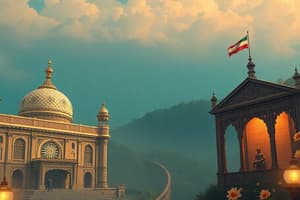Podcast
Questions and Answers
What principle ensures that the Constitution is considered the supreme law?
What principle ensures that the Constitution is considered the supreme law?
Which system is primarily employed for elections as per the discussed constitutional provisions?
Which system is primarily employed for elections as per the discussed constitutional provisions?
What principle has replaced parliamentary sovereignty in the South African Constitution?
What principle has replaced parliamentary sovereignty in the South African Constitution?
What is a key characteristic of the democratic principles outlined in the Constitution?
What is a key characteristic of the democratic principles outlined in the Constitution?
Signup and view all the answers
Which body is at the apex of the judicial system in South Africa?
Which body is at the apex of the judicial system in South Africa?
Signup and view all the answers
What is emphasized as essential within the Bill of Rights?
What is emphasized as essential within the Bill of Rights?
Signup and view all the answers
What challenge arose during the constitutional negotiation process?
What challenge arose during the constitutional negotiation process?
Signup and view all the answers
What does the Bill of Rights in the South African Constitution specifically impose on the state?
What does the Bill of Rights in the South African Constitution specifically impose on the state?
Signup and view all the answers
Which political group's vision was focused on drafting a constitution by a democratically elected body?
Which political group's vision was focused on drafting a constitution by a democratically elected body?
Signup and view all the answers
What legacy is highlighted as a significant factor in the functioning of the South African Constitution?
What legacy is highlighted as a significant factor in the functioning of the South African Constitution?
Signup and view all the answers
What is the primary mechanism for citizens to influence political choices in South Africa?
What is the primary mechanism for citizens to influence political choices in South Africa?
Signup and view all the answers
What was a significant feature of the provisions agreed upon by ANC and NP?
What was a significant feature of the provisions agreed upon by ANC and NP?
Signup and view all the answers
Which concept is underscored regarding the democratic state in South Africa?
Which concept is underscored regarding the democratic state in South Africa?
Signup and view all the answers
What is a key feature of the South African Constitution regarding elections?
What is a key feature of the South African Constitution regarding elections?
Signup and view all the answers
What was one of the main responsibilities outlined for the judiciary in the new constitutional framework?
What was one of the main responsibilities outlined for the judiciary in the new constitutional framework?
Signup and view all the answers
Which aspect of governance is emphasized by the system of separation of powers in the South African Constitution?
Which aspect of governance is emphasized by the system of separation of powers in the South African Constitution?
Signup and view all the answers
What aspect of pre-colonial history complicates the understanding of South Africa's constitutional past?
What aspect of pre-colonial history complicates the understanding of South Africa's constitutional past?
Signup and view all the answers
How is the legal pluralistic nature of South Africa's society significant in discussions about its Constitution?
How is the legal pluralistic nature of South Africa's society significant in discussions about its Constitution?
Signup and view all the answers
What role do courts play regarding the Constitution and the Bill of Rights?
What role do courts play regarding the Constitution and the Bill of Rights?
Signup and view all the answers
Which year marked the establishment of the current South African state as we know it?
Which year marked the establishment of the current South African state as we know it?
Signup and view all the answers
The South African Constitution encourages what democratic principle?
The South African Constitution encourages what democratic principle?
Signup and view all the answers
What is a primary challenge in discussing the historical context of the South African Constitution?
What is a primary challenge in discussing the historical context of the South African Constitution?
Signup and view all the answers
What fact complicates the interpretation of South Africa's constitutional history?
What fact complicates the interpretation of South Africa's constitutional history?
Signup and view all the answers
What is one interpretation concerning the classification of the South African Constitution?
What is one interpretation concerning the classification of the South African Constitution?
Signup and view all the answers
Study Notes
South African Constitutional Overview
- The South African Constitution, adopted in 1996, establishes a sovereign democratic state centered on human dignity, equality, non-racialism, and non-sexism.
- It replaces parliamentary sovereignty with constitutional sovereignty, declaring the Constitution as the supreme law of the Republic.
- Any law or conduct contrary to the Constitution is deemed invalid, creating a framework where obligations must be fulfilled according to its provisions.
Bill of Rights
- The Constitution includes a comprehensive Bill of Rights that details civil, political, social, and economic rights.
- It imposes both negative and positive obligations on the state, as well as additional duties on private entities, to respect and ensure these rights.
- The courts, especially the Constitutional Court, serve as guardians of the Constitution and can invalidate legislation inconsistent with it.
Separation of Powers
- Three branches of government—legislature, executive, and judiciary—are established with a system aimed at maintaining checks and balances.
- The independence of the judiciary is crucial, allowing it to interpret and enforce laws without external influences.
Democratic Principles
- Citizens have the explicit right to form or join political parties, engage in activities regarding these parties, and campaign freely.
- The Constitution guarantees regular, free elections based on universal suffrage on a common voters roll, favoring a proportional representation electoral system.
Negotiation and Adoption Process
- Initial negotiations for the Constitution encountered challenges, particularly with the ANC's temporary exit from discussions due to slow progress in 1992.
- The Multi-Party Negotiating Forum (MPNF) eventually adopted an interim Constitution in 1993, which was ratified by the apartheid Parliament.
- The ANC and NP had different visions for democracy: ANC preferred a constitution drafted by a democratically elected body, while NP advocated for a constitution by the unelected MPNF.
Historical Context
- The narrative of South Africa's political history beginning in 1652 with the arrival of Jan van Riebeeck is contested; pre-colonial societies existed and occupied the land prior to European settlement.
- The notion that constitutional history began in 1910 with the creation of the Union of South Africa is considered overly simplistic and colonial.
- Pre-colonial governance structures are complex and often overlooked, emphasizing the need to consider diverse perspectives in understanding South Africa’s legal past.
Legacy of Apartheid
- The Constitution operates within a context shaped by the remnants of apartheid, influencing social and political dynamics.
- Current political structures reflect a one-party dominant democracy, raising questions about how the Constitution can be interpreted and classified in light of these historical legacies.
Studying That Suits You
Use AI to generate personalized quizzes and flashcards to suit your learning preferences.
Description
This quiz explores the transformative nature of the South African Constitution adopted in 1996. It examines the challenges faced by political parties in achieving their agendas and the importance of compromise within the framework of a democratic state. Test your knowledge of this foundational legal document and its implications for human dignity and equality.




